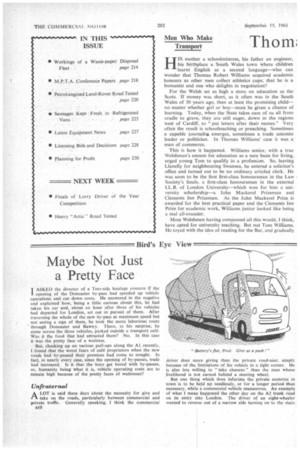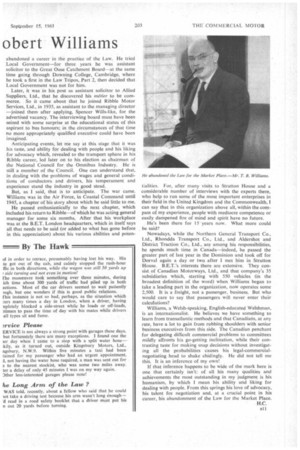Men Who Make Transport
Page 44

Page 45

If you've noticed an error in this article please click here to report it so we can fix it.
Thom; obert Williams
HIS mother a schoolmistress, his father an engineer, his birthplace a South Wales town where children learnt English as a second language—who can wonder that Thomas Robert Williams acquired academic honours as other men collect athletics cups-, that he is a humanist and one who delights in negotiation?
For the Welsh set as high a store on education as the Scots. If money was short, as it often was in the South Wales of 30 years ago, then at least the promising child— no matter whether girl or boy—must be given a chance of learning. Today, when the State takes care of us all from cradle to grave, they are still eager, down in the regions west of Cardiff, to "put letters after their names." Very often the result is schoolteaching or preaching. Sometimes a capable journalist,. emerges, sometimes a trade unionist leader or politician. In Thomas Williams' case it was a man of commerce.
This is how it happened. Williams senior, with a true Welshman's esteem for education as a sure basis for living, urged young Tom to qualify in a profession. So, leaving Llanelly for neighbouring Swansea, he entered a solicitor's office and turned out to be no ordinary articled clerk. He was soon to be the first first-class honoursrnan in the Law Society's finals, a first-class honoursman in the external LL.B. of London University—which won for him a university scholarship—a John Mackerel Prizeman and Clements Inn Prizeman. As the John Mackerel Prize is awarded for the best practical paper and the Clements Inn Prize for academic work, Williams junior looked like being a real all-rounder.
Most Welshmen having compassed all this would, 1 think, have opted for university teaching. But not Tom Williams. He toyed with the idea of reading for the Bar, and gradually abandoned a career in the practice of the Law. He tried Local Government—for three years he was assistant solicitor to the Great Ouse Catchment Board—at the same time going through Downing College, Cambridge, where he took a first in the Law Tripos, Part 2, then decided that Local Government was not for him.
Later, it was in his post as assistant solicitor to Allied Suppliers, Ltd., that he discovered his metier to be commerce. So it came about that he joined Ribble Motor Services, Ltd., in 1935, as assistant to the managing director —joined them after applying, Spencer Wills-like, for the advertised vacancy. The interviewing board must have been seized with some surprise at the educational status of this aspirant to bus honours; in the circumstances of that time no more appropriately qualified executive could have been imagined.
Anticipating events, let me say at this stage that it was his taste, and ability for dealing with people and his liking for advocacy which, revealed to the transport sphere in his Ribble career, led later on to his election as chairman of the National Council for the Omnibus Industry. He is still a member of the Council. One can understand that, in dealing with the problems of wages and general conditions of conductors and drivers, his temperament and experience stand the industry in good stead.
But, as I said, that is to anticipate. The war came. Williams was in the Air Force, in Coastal Command until 1945, a chapter of his story about which he said little to me.
He passed enthusiastically to the next chapter, which included his return to Ribble—of which he was acting general manager for some six months. After that his workplace was at the B.E.T. London headquarters, which in itself says all that needs to be said (or added to what has gone before in this appreciation) about his various abilities and poten tialities. For, after many visits to Stratton House and a considerable number of interviews with the experts there, who help to run some of the most important enterprises in their field in the United Kingdom and the Commonwealth, I can say that in this organization above all, within the compass of my experience, people with mediocre competence or easily dampened fire of mind and spirit have no future.
He's been there for 15years now. What more could be said?
Nowadays, while the Northern General Transport Co.. Ltd., Rhondda Transport Co., Ltd., and Aldershot and District Traction Co., Ltd., are among his responsibilities, he spends much time in Canada—indeed, he passed the greater part of last year in the Dominion and took off for Dorval again a day or twa after I met him in Stratton House. B.E.T.'s interests there are extensive. They consist.of Canadian Motorways, Ltd., and that company's 35 subsidiaries which, starting with 550 vehicles (in the broadest definition of the word) when Williams began to take a leading part in the organization, now operates some 2,500. It is a freight, not a passenger, business. But who would care to say that passengers will never enter their calculations?
Williams, a Welsh-speaking, English-educated Welshman, is an internationalist. He believes we have something to learn from transatlantic methods and that Canadians, at any rate, have a lot to gain from rubbing shoulders with senior business executives from this side. The Canadian penchant for delegating difficult commercial problems to committees mildly affronts his go-getting inclination, while their contrasting taste for making snap decisions without investigating all the probabilities causes his legal-commercialnegotiating head to shake chidingly. He did not tell me this. It is an inference of my own!
If that inference happens to be wide of the mark here is one that certainly isn't: of all his many qualities and achievements the most outstanding in my judgment is his humanism, by which I mean his ability and liking for dealing with people. From this springs his love of advocacy, his talent for negotiation and, at a crucial point in his career, his abandonment of the Law for the Market Place. H.C. al l




































































































































